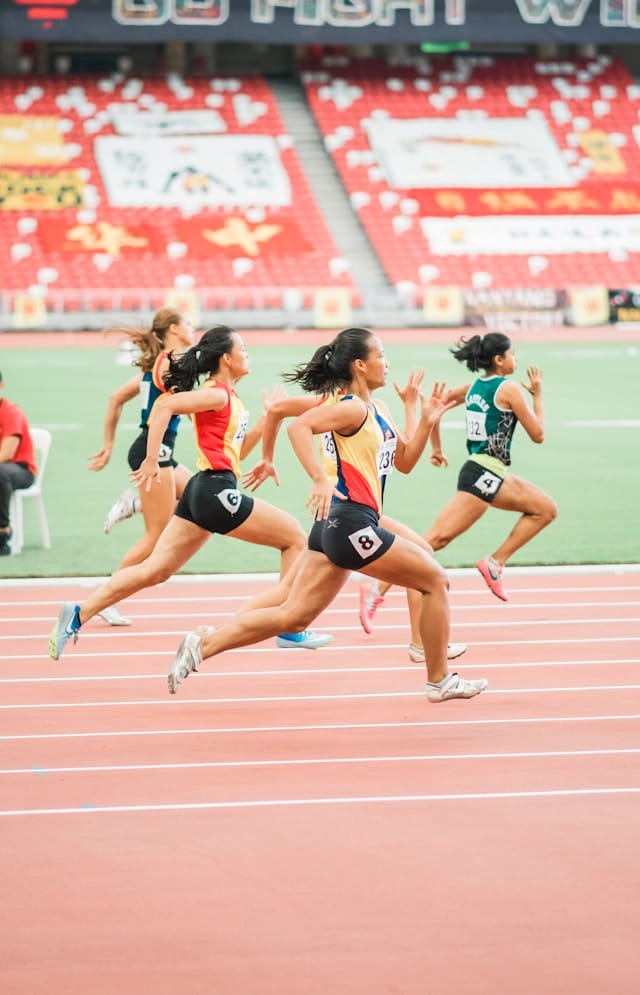How Can Hurdle Technique Workshops Enhance Performance for Track Athletes?

In the thrill of track and field, the exhilarating sport of hurdling stands out. It requires a blend of agility, speed, and precise leg technique to overcome the hurdles. As a sport discipline, hurdling is more than just running fast and jumping over obstacles. It calls for a deep understanding of body movements and synchronization of strides. In this regard, hurdle technique workshops play a pivotal role in molding athletes into exceptional hurdlers. They equip athletes with a variety of drills and training practices to hone their hurdling skills. This article will delve into the ways these workshops can enhance performance for track athletes.
Understanding the Hurdle Technique
Hurdling is a demanding discipline that requires a special skill set compared to conventional sprinting. So, what makes a good hurdler? The secret lies in mastering the hurdle technique, which will be the lead focus in any hurdling workshop.
Avez-vous vu cela : How to Integrate Sport-Specific Pilates into Rehabilitation for Swimmers?
The hurdle technique involves a unique blend of sprinting and jumping, which requires perfect coordination between your speed and leg movements. To effectively clear a hurdle, athletes must be able to maintain their speed while accurately timing their jumps. The technique also demands a certain degree of flexibility and strength, particularly in the hip flexors and hamstring muscles.
The technique is divided into three main phases: the approach, the hurdle clearance, and the landing. Good coaches will ensure that athletes practice these phases individually and collectively for a perfect hurdling rhythm. They will help athletes understand that the efficiency in hurdling doesn’t lie in jumping high over the hurdles, but in maintaining high velocity while minimally interrupting their running rhythm.
En parallèle : What’s the Optimal Macronutrient Ratio for Recovery in Rugby Players Post-Match?
The Importance of Hurdle Drills
In hurdle technique workshops, a significant amount of time is dedicated to hurdle drills. These drills are designed to help athletes perfect their hurdling rhythm, step patterns and overall technique.
Hurdle drills are an essential part of hurdling training. They help to reinforce correct form and action, as well as increase speed and fluidity over the hurdles. Drills can be broken down into targeted exercises to work on specific aspects of hurdling, such as the take-off, flight, and landing.
The three-step and five-step drills, for instance, help athletes work on their stride frequency and length, crucial for maintaining speed between hurdles. Lead leg and trail leg drills, on the other hand, focus on the leg action over the hurdle, ensuring that athletes maintain good form and avoid hitting the hurdle.
How Workshops Enhance Speed
Speed is crucial for any track athlete. However, in hurdling, speed is not just about running fast. It’s about maintaining speed while overcoming the hurdles. This is where hurdle technique workshops come into play.
Workshops provide a platform for athletes to work on their sprinting technique in combination with hurdling. The coaches help athletes to integrate the various components of hurdle technique into their sprinting, making them faster and more efficient hurdlers.
Moreover, these workshops typically incorporate specific strength and conditioning sessions that target key muscle groups involved in hurdling. These sessions can lead to improved power and speed, which are vital for successful hurdling.
Role of Practice and Repetition in Hurdling
The adage "practice makes perfect" holds true in hurdling. Repetition is the key to mastering the hurdle technique, and workshops provide ample practice opportunities for budding hurdlers.
During workshops, athletes will be exposed to numerous repetitions of hurdling drills under the watchful eyes of experienced coaches. This kind of monitored practice ensures that mistakes are identified and corrected on the spot, enhancing the learning process.
Moreover, practice is not limited to physical drills. Mental practice, such as visualization, is often part of these workshops. Visualization helps athletes imagine themselves executing the perfect hurdle technique, which can, in turn, translate to improved performance on the track.
The Impact of Proper Coaching
The success of hurdle technique workshops largely hinges on the quality of coaching provided. Coaches with a sound understanding of hurdling techniques and drills can significantly enhance the performance of track athletes.
Good coaches not only teach the proper hurdle technique but also inspire and motivate athletes to achieve their best. They offer personalized advice and feedback, helping athletes to refine their skills and work on their weaknesses. This guidance and mentorship can make all the difference in an athlete’s performance and confidence on the track.
In conclusion, hurdle technique workshops offer a comprehensive platform to learn, practice, and perfect the art of hurdling. They provide a blend of theory and practical sessions that help athletes to understand the technical aspects of hurdling, work on their speed, practice hurdle drills, and benefit from the guidance of experienced coaches.
Harnessing Speed Agility and Strength Training
Two key aspects that play a significant role in hurdling performance are speed agility and strength training. Hurdle technique workshops offer a comprehensive training program that integrates these elements to help improve the athlete’s overall performance.
In terms of speed agility, athletes are trained on how to maintain high velocity while tackling hurdles. This can be particularly challenging as the athlete must accurately time their hurdle jumps to minimize interruptions to their running rhythm. To aid this, speed training exercises such as the trail leg and lead leg drills are incorporated into the workshop. This allows athletes to develop a reliable hurdle rhythm.
Strength training, on the other hand, focuses on building the key muscle groups involved in hurdling, particularly the hip flexors and hamstring muscles. These muscles are crucial for hurdle clearance and landing. Exercises such as resistance training are commonly used in these workshops to help athletes build the necessary strength.
The marriage of speed agility and strength training within the workshops aims to enhance an athlete’s sprint hurdles performance, making them stronger and faster over and under the hurdles.
The Power of Repetitive Hurdle Drills
Hurdle technique workshops lean heavily on the power of repetition and practice. Through repeated hurdle drills, athletes improve their hurdle technique, perfect their hurdle step, and enhance their hurdle rhythm.
Repetition allows athletes to engrave the right techniques into their muscle memory. It helps them refine their hurdle jumps, making them more efficient and fluid. This is often achieved through a series of training hurdle drills that are designed to work on specific aspects of the hurdling technique.
For instance, the three-step and five-step drills focus on stride frequency and length – aspects that are crucial for maintaining speed between hurdles. Similarly, lead leg and trail leg drills work on the leg action over the hurdle, ensuring that athletes maintain good form and avoid hitting the hurdle.
It’s important to note that these drills are not just physical. Mental training is also a key aspect of any hurdle technique workshop. Athletes are encouraged to visualize themselves executing the perfect hurdle clearance, an exercise that can significantly improve performance on the track field.
Conclusion
Hurdling is a sophisticated discipline that requires more than just raw speed. Mastery in hurdling comes from understanding and skillfully executing the hurdle technique. Hurdle technique workshops offer athletes a unique opportunity to learn this technique, practice hurdle drills, and benefit from the guidance of experienced coaches.
These workshops blend theory with practice, creating an immersive learning environment for athletes. They help athletes improve their speed agility, build strength through targeted training, and perfect their hurdling rhythm through repetitive drills.
Under the watchful eyes of skilled coaches, athletes can refine their skills, work on their weaknesses, and ultimately, elevate their hurdling performance. In essence, hurdle technique workshops are a vital tool for any aspiring hurdler looking to make a mark in the thrilling world of track and field.
